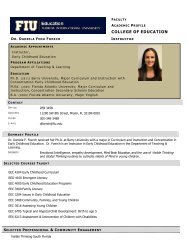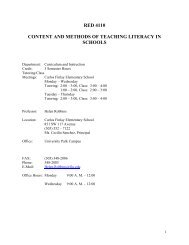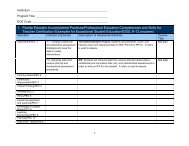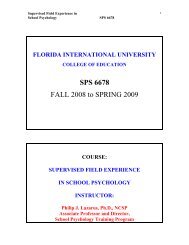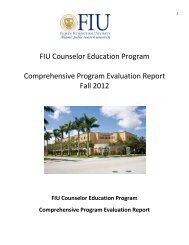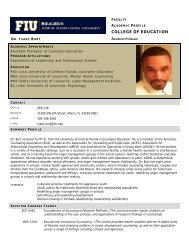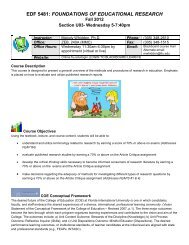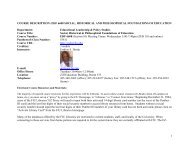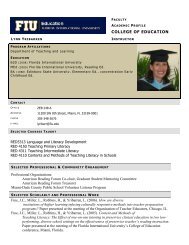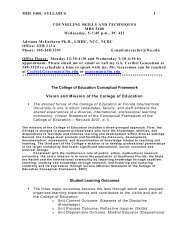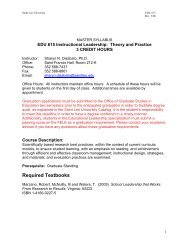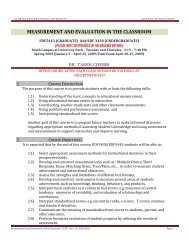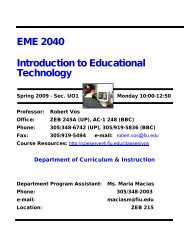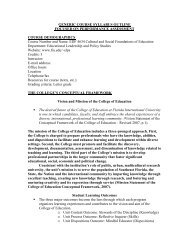2007 - College of Education - Florida International University
2007 - College of Education - Florida International University
2007 - College of Education - Florida International University
You also want an ePaper? Increase the reach of your titles
YUMPU automatically turns print PDFs into web optimized ePapers that Google loves.
focus. Students will thus see the world through eyes other than the dominant ones in terms <strong>of</strong><br />
class, background, identity, race, culture, and citizenship.<br />
Theoretical Framework<br />
As Americans navigate through the tumultuous waves <strong>of</strong> the effects <strong>of</strong> globalization,<br />
facing the increasing complexities in the world, there is rising concern that schools today are not<br />
adequately preparing students for the challenges <strong>of</strong> a changing world (Merryfield, 1998). This<br />
paper draws upon the theoretical work <strong>of</strong> several prominent educators, notably John Dewey<br />
(1916) who said that as a society progresses, it must understand its responsibility to convey and<br />
safeguard some <strong>of</strong> its best present achievements to help make a better future society. The school<br />
must be considered as the appropriate mechanism used to achieve this goal. Dewey (1916) saw<br />
educated citizens as more than a society <strong>of</strong> individuals with technical skills, vocational<br />
inclinations, and economic ambitions. Therefore, this paper will put forward a discussion to<br />
answer questions that will address the urgency <strong>of</strong> students becoming global citizens and<br />
achieving global literacy, and how teachers can bring about this change: (a) When we talk about<br />
global literacy, what are we trying to achieve and for whom (b) How might the challenges be<br />
addressed (c) How do teachers make choices (d) Do teachers have the conviction and selfdetermination<br />
to enact the initiatives<br />
Barber (2002) explains the paradox regarding U.S. global education: although this<br />
country is among the most diverse worldwide, with students from numerous cultures, we are<br />
among the least knowledgeable about our students’ native countries and cultures. Hanvey’s<br />
(1982) criteria for global education in the classroom have been succeeded by others who either<br />
added to the norms (Pike & Selby, 1988) or worked with variations <strong>of</strong> it (Kniep, 1991). Pike and<br />
Selby (1988) included values into global education; Tye and Tye (1992) state that global<br />
education engages students <strong>of</strong> all ages and in all subject matters.<br />
In the first major evaluation <strong>of</strong> world studies in schools, conducted among over 200<br />
teachers, Steiner (1992) found that teachers lacked the confidence and expertise needed to<br />
translate their otherwise positive attitude toward the subject. Since teachers are pivotal (Tucker,<br />
1990) in the delivery <strong>of</strong> global literacy, it is crucial that teachers are trained to have the<br />
confidence and conviction to make choices and face the challenges presented to them in an<br />
inclusive curriculum or teaching to include and embed a global focus. Many teachers are<br />
intimidated by words like globalization, global education, and global literacy (Merryfield, 2000)<br />
and unfortunately they have not been prepared to teach for diversity, challenge inequities, or<br />
even recognize the effects <strong>of</strong> globalization.<br />
Challenges<br />
The complexity <strong>of</strong> these global issues presents many challenges for teachers, students,<br />
and the community who must develop a unified effort to make the global education program<br />
successful. Implementing global education has proven contentious (Schukar, 1993). Werner<br />
(1991) explains that the general consensus is students should be trained to enter into an<br />
interdependent world, but limitations exist in the knowledge and rationale for this training. This<br />
paper will address some <strong>of</strong> the dilemmas.<br />
Challenges for Teachers<br />
One <strong>of</strong> the more prominent challenges for teachers as envisioned by the researcher and<br />
informed by global educators (Hanvey, 1982; Merryfield, 1998) is that those teaching global<br />
education must be competent in analyzing this complex world through lived experiences. This<br />
particular challenge will come easier to the well-traveled teacher or to the immigrant teacher who<br />
can share not only their experiences but also those <strong>of</strong> their students who hail from different<br />
13



